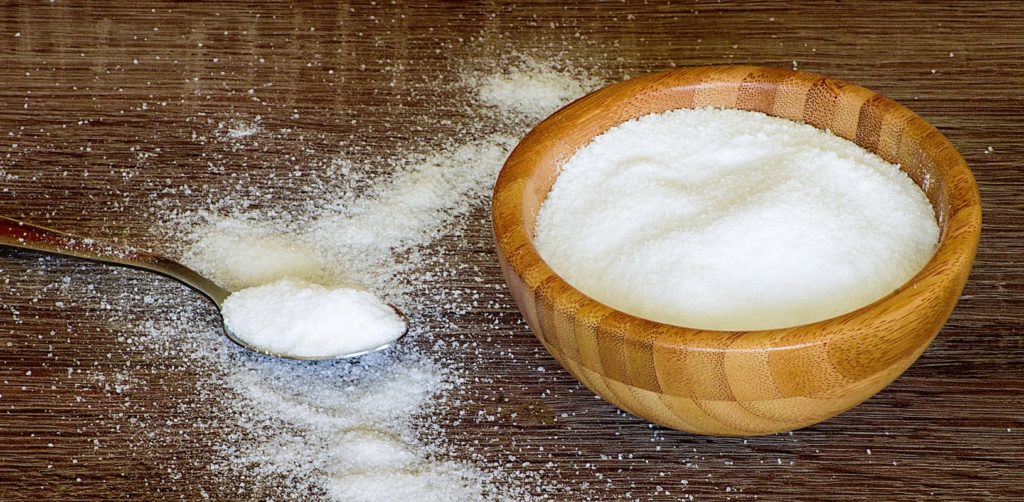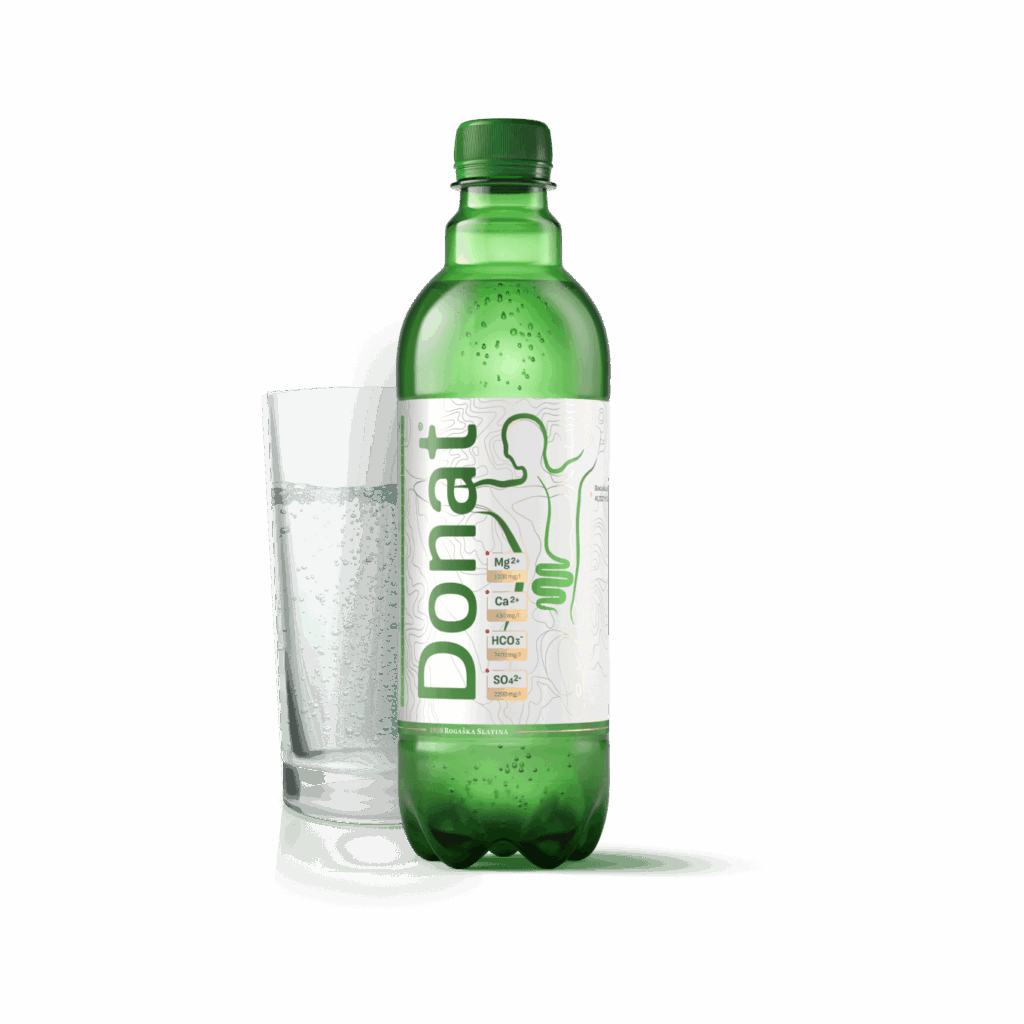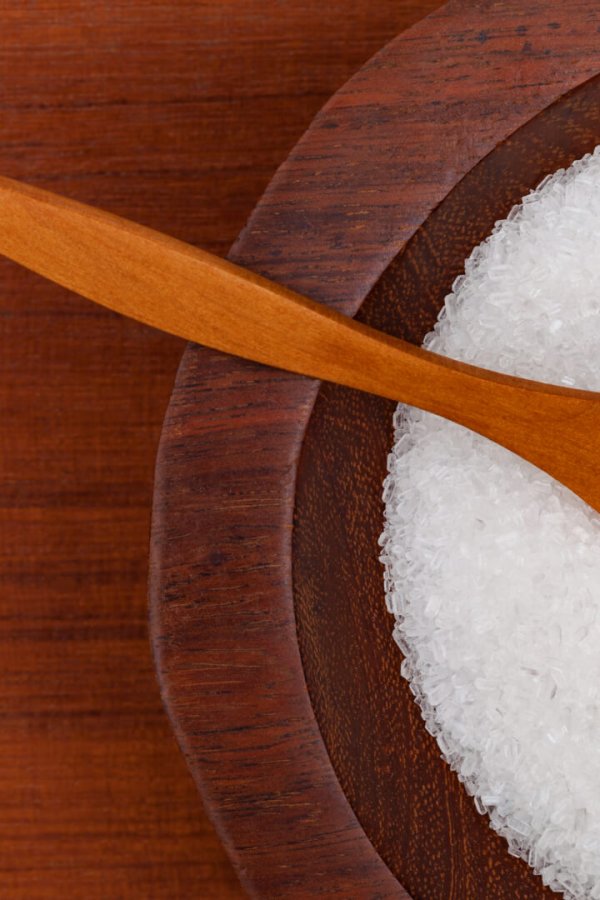Listen up, fans of tips and everyday remedies that can improve your health. This article will introduce you to a completely natural active ingredient that has many beneficial effects on the body, and also helps relieve slow digestion and constipation. It’s called Epsom salt. In this article, you will learn about its benefits and how to use it.

When our digestive system needs (natural) help
Constipation is one of the most common ailments of modern life. The main causes are convenience foods, stress, lack of exercise, and insufficient fluid intake. But it can also affect those who are striving to live healthier – it’s often an issue for pregnant women or the elderly, and it can occur when we change our routine, for example when we’re on holiday or travelling.
An unhealthy diet and lack of exercise slow down digestion and lead to constipation.
We all want quick relief, especially when we get constipated and feel unwell at an inconvenient time. We often resort to laxatives, of which there are plenty on the market. However, caution is essential.
Remedies that relieve constipation and those that speed up digestion have very different mechanisms of action, so care should be taken when choosing one. Some (stimulant laxatives) act aggressively and cause stomach cramps, and their long-term use can even lead to chronic constipation or lazy bowel syndrome.
But there are also remedies that are natural and safe for the body, such as the one featured in this article: Epsom salt. Although it should only be used occasionally and may cause problems if used in the wrong way – such as dehydration and loss of electrolytes – it does not pose a threat to digestion or health when consumed in moderation. Epsom salt, also known as bitter salt, can therefore be very useful for relieving constipation.
Let’s take a look at what makes it so effective and how to use it.
What is Epsom salt?
While Epsom salt may look like ordinary table salt, the only thing the two have in common is the word “salt” in the name. In fact, the chemical composition of Epsom salt is completely different – it’s magnesium sulphate, a compound of magnesium, sulphur, and oxygen. Its colourless crystals were discovered in the 1600s in the town of Epsom in England, hence the name Epsom salt.
It has long been considered an excellent natural remedy, known for its laxative effect, and it also benefits people who have a magnesium deficiency. Indeed, it’s the magnesium that makes Epsom salt so versatile and beneficial.
Magnesium sulphate can help us unwind and fall asleep more easily, and after strenuous exercise it relaxes the muscles and prevents cramps. Taking a bath with Epsom salt can relieve pain and reduce swelling, too.
Epsom salt is also useful in facial masks, as it effectively removes dead cells, and can be very helpful in removing foreign objects from the skin, such as small splinters and similar.
Epsom salt is an osmotic laxative
Those suffering from slow digestion will, of course, most appreciate its laxative effect. It belongs to the category of osmotic laxatives, which are considered safe when used occasionally or for short periods of time. It’s suitable for adults, children and the elderly, although it should be used under medical supervision in the case of children.
Osmotic laxatives work on the principle of osmosis: they draw water from the cells of the intestinal wall, which softens the stool and makes it easier for it to pass through the intestine. Since this is a mechanical process, there’s no risk of developing a dependency.
Epsom salt or magnesium sulphate relaxes and treats the body in a completely natural way, cleansing the gastrointestinal tract, boosting digestion and providing the organism with magnesium

Where to find Epsom salt
The magical white crystals of Epsom salt can be bought in pharmacies, food shops, and drugstores. You’ll usually find it in the section for laxatives or among personal care products. If you want to use it to tackle poor digestion, avoid Epsom salts with essential oils (intended for baths), and choose those without additives.
Magnesium sulphate is also available from many online retailers, both in the form of crystals and as an ingredient in soaps, balms, and oils.
How Epsom salt counteracts constipation
Used in moderation, Epsom salt is an excellent remedy for slow digestion, as it works by osmosis and increases the amount of water in the gut. This stimulates the bowel and makes it easier for faeces to travel through it.
This is because sulphates in Epsom salt bind with water contained in the cells of the intestinal wall. As a result, the volume of the intestinal contents increases by as much as three to five times. The pressure on the intestinal wall generated by this process is such that it triggers a bowel movement or peristalsis. At the same time, magnesium stimulates the secretion of intestinal hormones that stimulate peristalsis even more.
Because magnesium sulphate increases the amount of water in the gut, it also softens the stool, easing its passage through the bowel and thus its elimination.
Use of Epsom salt
As a remedy for slow digestion, Epsom salt is usually consumed dissolved in water. Its bitter and salty taste is not very pleasant, but adding a few drops of lemon can greatly improve it.
How to consume Epsom salt
Dissolve 2 to 4 teaspoons of magnesium sulphate in about 2 litres of water. For children under twelve years old, the recommended amount is 1 to 2 teaspoons in 2 decilitres of water. Drink this mixture immediately after preparation.
The effects of consuming Epsom salt can usually be felt within a few hours of ingestion. If it has no effect, prepare another dose, but not earlier than 4 hours after consuming the first one. However, drinking more than two glasses of water with Epsom salt per day is not recommended, as high doses of magnesium sulphate can have side effects such as nausea or bloating.
Treatment with Epsom salt is harmless, but care must be taken not to overconsume it.
How long should Epsom salt be consumed?
You should not continue treatment with Epsom salt for more than a week. If there are no positive results within this period, it’s best to consult your personal doctor before continuing. Afterwards, you should only use magnesium sulphate drinks if you have been advised to do so by a health professional.
What restrictions are there on the consumption of Epsom salt?
Caution is also needed with certain chronic diseases. If you suffer from kidney disease, frequent nausea or stomach pain, or if you follow a low-magnesium diet, you should consult your doctor before use.
Epsom salt is the main ingredient of Donat natural mineral water
If you want Epsom salt to awaken your digestion, there’s no better way to consume it than by drinking Donat natural mineral water. Magnesium sulphate is its main active ingredient, and the key to its beneficial effect on digestive processes.
Glauber’s salt
Experts consider Donat to be a sulphate laxative for this very reason, as it contains sodium sulphate in addition to magnesium sulphate. The former is also called Glauber’s salt, and also has a laxative effect. Glauber’s salt can also be purchased as a powder in many pharmacies and stores. It can be taken mixed with water, tea or natural juice.
Donat is clinically proven to relieve constipation and speed up digestion.
Donat is also a source of magnesium
Donat natural mineral water is an excellent source of magnesium, containing 1,000 mg per litre. Magnesium is a vital mineral that is involved in more than 300 biochemical processes in the body. It’s essential for strong, solid bones, a steady heartbeat and, of course, healthy and smooth digestion.
The magnesium in Donat complements the effect of sulphate ions, relaxing the muscles and further aiding peristalsis, the contraction of the muscles that push the stool through the intestines.
The effect of Donat is clinically proven
It’s been clinically proven that it’s Epsom salt in its natural form that makes Donat so effective in regulating digestion. The recommended intake of Donat is approximately 0.5 litres per day. It’s best to drink about 0.3 litres in the morning on an empty stomach, and a decilitre less before going to bed.
It’s been clinically proven that it’s Epsom salt in its natural form that makes Donat so effective in regulating digestion. The recommended intake of Donat is approximately 0.5 litres per day. It’s best to drink about 0.3 litres in the morning on an empty stomach, and a decilitre less before going to bed.
Using Epsom salt to cleanse the liver
Epsom salt is also promoted as a liver cleanser. It features in many cleansing recipes and diets online, and is an ingredient in many preparations sold for this purpose. However, it should be noted that the use of Epsom salt for liver cleansing is not scientifically supported. Indeed, experts actually advise against such procedures and any related preparations, as they can be harmful.
Instead of various Epsom salt-based treatments, a balanced diet with less saturated fatty acids and sufficient fluid intake is recommended for good liver health. A healthy lifestyle, which includes exercise and rest alongside a good diet, is the best way to detoxify your body.
Overcome constipation with a healthy lifestyle
While Epsom salt is a highly effective and above all harmless remedy for constipation, the long-term solution to slow digestion is a fundamental change in lifestyle.
This involves, first and foremost, switching to healthier dietary habits, with sufficient fibre (around 25–30 g/day) instead of too much fat, sugars, and salt. This is because fibre ensures adequate stool volume and makes it easier for the stool to pass through the intestines. Sufficient intake of fluids and enough exercise also play an important role in this – when we get moving, the digestive tract is set in motion.
For more on healthy habits to speed up digestion, we recommend you read the articles How to Deal with Poor Digestion.
The amount of fibre in the diet should be increased gradually to avoid bloating and problems with wind. If you’re wondering what else you can do to avoid such issues, be sure to also read the article on How to get rid of bloating.
Frequently Asked Questions
1. What is bitter salt?
Besides the similarities in their name and the way they look, bitter salt has no other connections with the regular, table salt due to its entirely different chemical composition. It is a compound of magnesium, sulfur, and oxygen, also known as magnesium sulphate or Epsom salt. Among other things, this salt is known for its detox and laxative effects, and it is recommended for people suffering from lack of magnesium.
2. What are the medicinal benefits of bitter salt?
Bitter salt works against stress, helps in regeneration of muscles after a strenuous workout, alleviates pain and reduces swellings. It also removes dead skin cells, and it helps in removing foreign matters from your body. It is also known for its laxative effect.Of course, there are different degrees of constipation, so it makes sense to adjust the exact dose accordingly. The updated Donat Moments app can be very useful in this regard, helping you choose the most suitable drinking regime, depending on the type of digestive disorder, and making sure you never miss your next dose. It’s available for free for iOS and Android devices.
3. How does bitter salt work against constipation?
Bitter salt belongs to the group of so-called osmotic laxatives, which means that it accelerates digestion based on osmosis. It increases the amount of water in intestines, and thereby increases the volume of the intestine content and creates a pressure necessary for the bowel movement, i.e. peristalsis.
4. How to consume bitter salt?
Epsom salt is usually melted in a glass of water. Adults are recommended to take two to four teaspoons in 2 dl of liquid, while children under 12 should take 1 – 2 teaspoons, also in 2 dl of water. Since the taste is quite bitter, we recommend adding a few drops of lemon, mint leaves, etc.
5. Is bitter salt one of the ingredients of Donat natural mineral water?
Magnesium sulphate is the main component of Donat natural mineral water. Bitter salt is not just its main active ingredient, but also the secret of its success in regulation of digestion in an efficient, but also harmless way.Using Epsom salt to cleanse the liver.
Sources:
Gröber, Uwe, Tanja Werner, Jürgen Vormann, and Klaus Kisters. “Myth or Reality—Transdermal Magnesium?” Nutrients, vol. 9,8 (2017): 813.
Fang, Xuexian, et al. “Dietary Magnesium Intake and the Risk of Cardiovascular Disease, Type 2 Diabetes, and All-Cause Mortality: A Dose–Response Meta-Analysis of Prospective Cohort Studies.” BMC Medicine, vol. 14, 1 (2016): 210.
“Bathing in a Magnesium-Rich Dead Sea Salt Solution Improves Skin Barrier Function, Enhances Skin Hydration, and Reduces Inflammation in Atopic Dry Skin.” International Journal of Dermatology, vol. 44,2 (2005): 151-157.
Smith, Jeffrey Michael, et al. “An Integrative Review of the Side Effects Related to the Use of Magnesium Sulfate for Pre-Eclampsia and Eclampsia Management.” BMC Pregnancy and Childbirth, vol. 13, 1 (2013): 34.
“Epsom Salt Bath: Benefits, How to Do It, and Risks.” Healthline, Healthline Media, 2024, https://www.healthline.com/health/epsom-salt-bath. Accessed 20 Nov. 2024.
“7 Things You Probably Didn’t Know About Epsom Salt.” Cleveland Clinic Health Essentials, 2024, https://health.clevelandclinic.org/7-things-you-probably-didnt-know-about-epsom-salt. Accessed 20 Nov. 2024.
“Epsom Salt: Uses and Health Benefits.” Medical News Today, 2024, https://www.medicalnewstoday.com/articles/epsom-salt#epsom-salt-uses. Accessed 20 Nov. 2024.
“Grenka Sol.” Dolenjske Lekarne, 2024, https://www.dolenjske-lekarne.si/prebavne-tezave/grenka-sol-282. Accessed 20 Nov. 2024.
Choose chapter:






